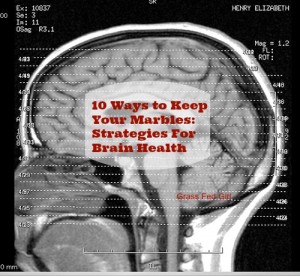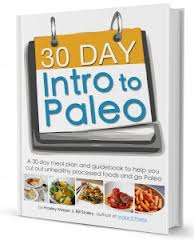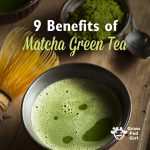Here is a great post about keeping your brain healthy into your later years. Many people do not realize that having lucidity long term brain has a lot to do with how we eat during our life. Nutrient poor diets full of processed foods coupled with fat phobia have created a new epidemic of dementia that mainstream doctors have not really tuned into.
A baseline for brain health is always diet rich in vitamins and mineral that is gluten and grain free, such as the Paleo Diet.
If we make sure to keep our blood sugar stable through the day by eating plenty of healthy fats and pastured proteins we are taking the first crucial steps in avoiding brain degeneration through controlling blood sugar control. It is also important to manage stress and get a proper amounts of sleep which will also provide a great deal of protection in reducing the fire in the brain which is dementia.
Here are some more in-depth steps to achieving brain health from my trusty intern Coco Noel who breaks it down a little further!

How to Have (and Keep) a Healthy Brain By Coco Noel
My great-uncle poured himself a glass of scotch. And then he drank another glass. And another. And another, until he’d emptied the bottle. When his wife came home, she found him spread eagle on the floor, too drunk to stand up.
My great-uncle isn’t an alcoholic; he has Alzheimer’s disease and simply forgot that he’d already had a drink when he fixed himself another. Sometimes he forgets how much food he’s had to eat and overeats to the point of being sick. Other times, he has trouble recognizing me. Eventually, the disease will destroy the part of his brain that holds his oldest and most precious memories.
1 in 3 seniors will have some form of dementia when they die. Alzheimer’s is the 6th leading cause of death, and once you develop it, there is very little that can be done to slow its progression.
Luckily, there are steps you can take to help keep your mind sharp and healthy.
It’s never too soon to start caring for your brain!
Ways To Keep Your Brain Healthy
Optimize omega 3 fatty acids
A 2009 study in the Journal of Alzheimer’s Disease suggests that inflammation may trigger Alzheimer’s disease. Inflammation has also been implicated in cancer, arthritis, and heart disease. Omega 3 fatty acids are anti-inflammatory, are found in high concentrations in the brain, and play an important role in brain function. Good sources of omega 3s are: wild fatty fish like salmon, tuna and mackerel, grass-fed beef and dairy, and pastured chickens and eggs. Flaxseeds, chia seeds, and nuts like walnuts are other omega 3 sources that can be good in moderation but some experts believe these nuts/seeds are not as bioavailable as animal sources.
Read my post on omega 3 fats here
Get enough sleep
Sleep deprivation inhibits your ability to think, problem-solve, and process, store and recall information. Most adults need at least 8 hours of sleep per night for memory formation and retention. Black out curtains (or a sleep mask), white noise or earplugs, and a room temperature of 60-68F degrees will help ensure a good night’s sleep.
Get your B’s (B Vitamins)
High levels of homocysteine, an amino acid, have been linked to dementia. Getting plenty of the B vitamins folic acid, B6, and B12 can lower homocysteine. A 2013 study found that high-dose B vitamin treatment reduced the loss of brain cells in areas vulnerable to Alzheimer’s disease. Good sources of these B vitamins include leafy greens, seafood such as oysters and wild fish, and grass fed beef. You can also supplement with a high quality B-complex.
Drink Your Greens (Tea that is)
Green tea, that is. Epigallocatechin gallate (EGCG) is a compound in green tea that may improve spatial memory. Studies have also shown it to be highly effective at preventing memory-robbing brain plaques from forming. Aim for 1-2 cups of green tea per day, or try matcha – a variety of green tea that contains up to 165 times more EGCG than ordinary green tea. Here’s where things get tricky: protein prevents EGCG from being properly absorbed, but vitamin C increases the absorption. For maximum brain-boosting benefits, have your tea between meals and with a bowl of vitamin C-rich foods like broccoli, strawberries, or kiwi.
Read my post on matcha green tea here!
Get moving!
Exercise helps maintain blood cells to the brain. Reduce your risk of heart attack, stroke and diabetes – and protects against those risk factors for Alzheimer’s disease and dementia.
Eat berries
Antioxidant-rich berries can impact learning and memory. This effect is attributed to the interaction of berry polyphenols with aging neurons. Evidence suggests that polyphenols accumulate in the brain following long-term consumption. As part of a healthy brain diet, make a habit of reaching for fresh or frozen organic berries – each type of berry offers unique antioxidants and polyphenols, so aim for variety.
Relax and Manage Stress
The findings from a recent Swedish study suggest that steroids released in the brain during periods of stress have the power to hinder general brain activity and increase your risk of degenerative brain conditions. Help keep your brain healthy and sharp by reducing or effectively managing your stress. Mediation, light exercise, maintaining meaningful relationships and not over-committing are all ways to reduce your stress load and keep your brain happy.
Get more ideas on how to de-stress in my post on stress here.
Have a drink
The Rotterdam study published in the Lancet found moderate alcohol intake (1-3 drinks per day) to be associated with a reduced risk of dementia in elderly individuals. A glass of wine a few times a week with dinner is a fine choice – just stay away from sugary mixed drinks and cocktails.
Read my article on the best alcoholic drink choices here:
Avoid BPA
Bisphenol A (BPA) is a chemical found in many consumer goods. A 2013 Duke University study found that “BPA may impair the development of the central nervous system, and raises the question as to whether exposure could predispose animals and humans to neurodevelopmental disorders,” said lead author Wolfgang Liedtke. Yikes! Reduce your exposure to BPA by being aware of these common BPA-containing culprits: some receipts (tip: if a black line appears when you run your fingernail over the paper, it contains BPA), plastic water bottles and containers, and the lining of metal cans. BPA can penetrate your skin when touched, and can leach into foods or liquids it comes in contact with. Avoid touching receipts whenever possible, and look for water bottles, containers, and canned goods specifically labeled “BPA free.” Or an even better option is to just look for stainless steel or glass containers then you don’t have to worry about the BPA.
I use these bpa free storage containers.
Add a little spice
India, where people consume large amounts of the curry-like spice turmeric, has 1/4 the rate of Alzheimer’s as the United States. Turmeric’s magic comes from curcumin which is the pigment that makes the spice bright yellow. Curcumin binds to excess iron and copper in the brain – metals that increase oxidative stress and make you susceptible to brain aging – and carries them away.
Read my post on turmeric here.
Bonus tip:
Consider adding coconut oil to your diet
In 2004, a study in the journal Neurobiology of Aging, showed that the kind of fat found in coconut oil (medium chain triglycerides) may improve brain function in people with mild cognitive impairment. The study was very small, and while a larger study is currently underway to explore what role the fat in coconut oil might play in preventing cognitive decline or improving brain function, the jury is still out.
Do you want to take proactive steps to protect your brain?
- A full 30 Day meal plan (breakfast, lunch, and dinner ideas for 30 days), broken down week by week
- Shopping lists for each week, including a handy list of basics & essentials
- Detailed explanations about which foods to eat and why you should eat them
- Nearly 100 recipes which are referenced in the meal plan
- Weekly coaching sheets which help you plan ahead meals, explore the science via links to online articles, and even videos to show you how to cook certain dishes or explain advanced concepts.
- And the best part is, it all works as a cohesive package to help you through that first critical month!
This is a great e-guide for getting started!
Get Started on healing your body today!
Click here for instant access!
http://www.ncbi.nlm.nih.gov/





Read my commentary on this story regarding coconut oil and Alzhiemer’s from CBN here . While this is a great story showing how ketones and coconut oil can help with Alzheimer’s disease, it does not even address the whole issue of cholesterol uptake to the brain as I wrote about above. Dr. Newport admits that her husband Steve was taking statins (cholesterol lowering drugs) until she took him off of them in 2009, after studying the cholesterol issue. She stops short, however, in recommending that others suffering from Alzheimer’s do the same. Until the media and the general public wake up to the facts regarding all the serious side effects from cholesterol-lowering statin drugs , simply adding coconut oil to one’s diet might only have a minimal effect.
Read my commentary on this story regarding coconut oil and Alzhiemer’s from CBN here . While this is a great story showing how ketones and coconut oil can help with Alzheimer’s disease, it does not even address the whole issue of cholesterol uptake to the brain as I wrote about above. Dr. Newport admits that her husband Steve was taking statins (cholesterol lowering drugs) until she took him off of them in 2009, after studying the cholesterol issue. She stops short, however, in recommending that others suffering from Alzheimer’s do the same. Until the media and the general public wake up to the facts regarding all the serious side effects from cholesterol-lowering statin drugs , simply adding coconut oil to one’s diet might only have a minimal effect.